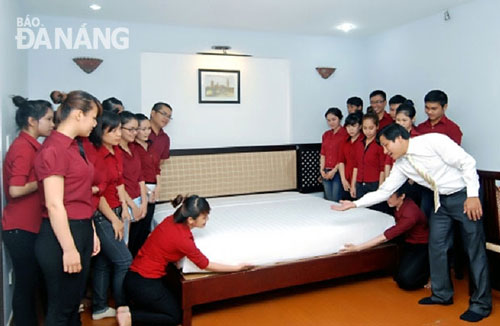Serious shortage of qualified human resources for tourism
The increasing number of international-standard holiday resorts, hotels and other hospitality services over recent years have made Da Nang into an attractive destination for visitors from both home and abroad. However, the quality of the human resources involved in the city’s tourism sector has yet to meet the sector’s requirements.
Most of the city’s universities have mainly focussed on providing only training programmes on tourism administration skills. Meanwhile, the local tourism sector is now in desperate need of employees who possess foreign language proficiency and demonstrate high-level skills at bed-making, table setting, cooking and bar services. Currently, the city is now facing a severe shortage of restaurants providing for Muslim tourists arriving in the city, along with chefs who specialise in European cuisine. In addition to these disadvantages, many graduates from local universities have yet to improve their soft-skills such as in interpersonal communication and problem-solving. Therefore, many local tourism businesses have to spend too much time training their newly-recruited employees.
 |
| Local students practising bed-making at a local hotel |
According to the municipal Department of Culture, Sports and Tourism, there are currently about 16,000 employees in the local tourism sector. The city has seen a year-on-year rise of around 2,000 rooms in local hotels whilst there is a shortage of employees involved in bed-making, table setting and reception services. This has adversely affected the local tourism services over the past year. The number of qualified employees currently account for only 50% of the total working in the local tourism sector.
In an attempt to solve the above-mentioned problems, many universities, junior colleges and intermediate schools across the city have changed their training programmes to meet the current recruitment needs.
In particular, the city’s University of Economics has recently developed a new training programme similar to that of the Haaga-Helia University of Applied Sciences in Finland.
Over past years, the Vietnamese-Australian Vocational College has focused on upgrading its existing facilities in order to meet the increasing demands of the city’s tourism sector. To date, the school has offered 15 educational programmes, providing skilful employees who meet the recruitment requirements of local 5-star resorts.